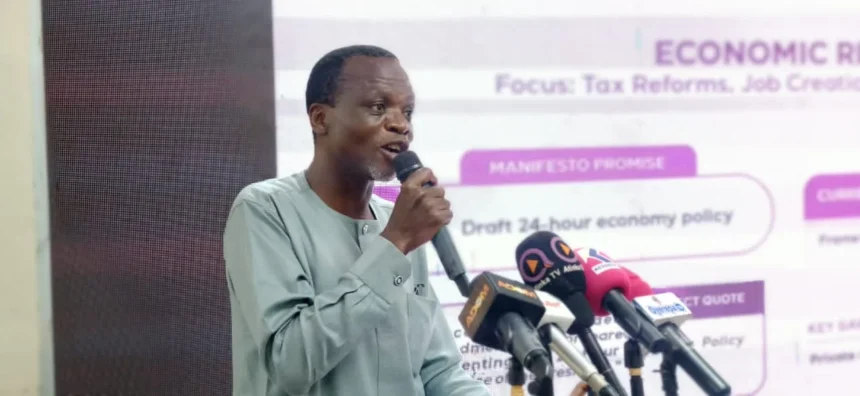Dr. George Domfe, a Development Economist at the University of Ghana, has dedicated months to understanding the complex issue of Ghana’s currency depreciation and its alleged links to Dr. Mahamudu Bawumia, Ghana’s former Vice President.
As a Public Sector Economist, Domfe sets out to clarify a crucial point: the claim that “Bawumia destroyed the economy by pushing the exchange rate to $1 = GHS17” is overly simplistic, misleading, and fails to account for broader global economic factors.
The Beginning of the Term – 2017:
When the New Patriotic Party (NPP) government, led by President Akufo-Addo, assumed office in January 2017, the exchange rate stood at $1 = GHS4.20. During the early years of their administration, Ghana witnessed a relatively stable currency performance. By January 2021, the exchange rate had risen to GHS5.85 to the dollar, marking a 27% depreciation. Despite this rise, this period was still one of the most stable in recent history, with the cedi performing better compared to many of its regional peers.
The Stability of the First Term:
Dr. Domfe highlights that the first term of the Akufo-Addo administration, although showing some depreciation, was not unusual in the context of global economic conditions. Currency depreciation is a common phenomenon in many emerging markets, and Ghana’s performance was not an outlier. In fact, the economy remained relatively stable, with the cedi performing better than expected considering the global pressures it was under.
The Global Disruptions – 2022:
By January 2022, the rate stood at $1 = GHS6.20, a manageable depreciation considering the global economic environment. However, the outbreak of the Russia–Ukraine war in early 2022 created massive global disruptions. The war led to soaring crude oil prices (from $72 to $121 per barrel), spiraling freight costs (up 300%), and severe inflation across major economies like the UK, the USA, and Germany. The war caused significant ripple effects, and Ghana, heavily reliant on imports, felt the pressure almost immediately.
Pressure on the Cedi:
With the increase in global prices, Ghanaian importers now needed significantly more U.S. dollars to purchase the same volume of goods. The growing demand for foreign currency in a country that already had limited foreign exchange reserves placed severe pressure on the cedi. The Bank of Ghana intervened, but to stabilize the exchange rate, it had to dip into its reserves, which by mid-2022 were already nearing depletion.
The Decline of the Cedi – 2022:
By July 2022, the interbank exchange rate had skyrocketed to GHS8.20 to the dollar, and in the forex market, it reached an alarming GHS17. This sharp depreciation was not the result of domestic policy failures or mismanagement, as critics often claim, but rather the direct impact of global economic shocks. The global rise in oil and freight costs and the fallout from the Russia–Ukraine war had triggered the depreciation. Dr. Domfe stresses that these external factors were largely out of Ghana’s control.
A Turnaround by December 2022:
By the end of 2022, the exchange rate saw some stabilization. With the Bank of Ghana securing additional foreign exchange support, the rate improved to around GHS8 per dollar. This recovery is a testament to the Bank’s resilience and ability to stabilize the currency, despite the ongoing global pressures. Dr. Domfe suggests that this resilience demonstrates the proactive steps taken by the Bank of Ghana to manage the situation, rather than any failure of economic policy.
Conclusion – Bawumia’s Role:
Dr. Domfe concludes by challenging the narrative that Vice President Bawumia is responsible for the cedi’s depreciation. He argues that the severe drop in the currency’s value was driven by global economic forces, not domestic policy failures. While no government is exempt from scrutiny, Domfe believes that understanding the true cause of the cedi’s struggles requires a broader perspective on the global economic context and the ongoing challenges that Ghana faces in a turbulent world economy.
In essence, blaming Bawumia for global economic shifts not only misrepresents the facts but also distracts from the larger, more complex picture of economic resilience and recovery in the face of unprecedented challenges.
Source: metrotvonline.com




